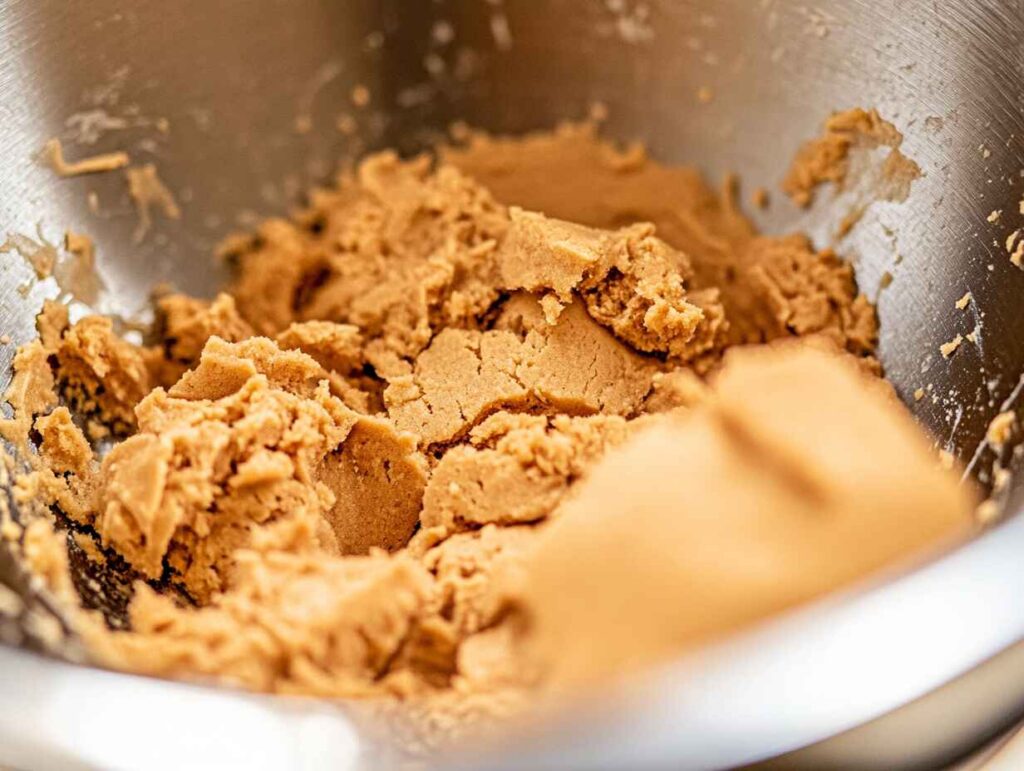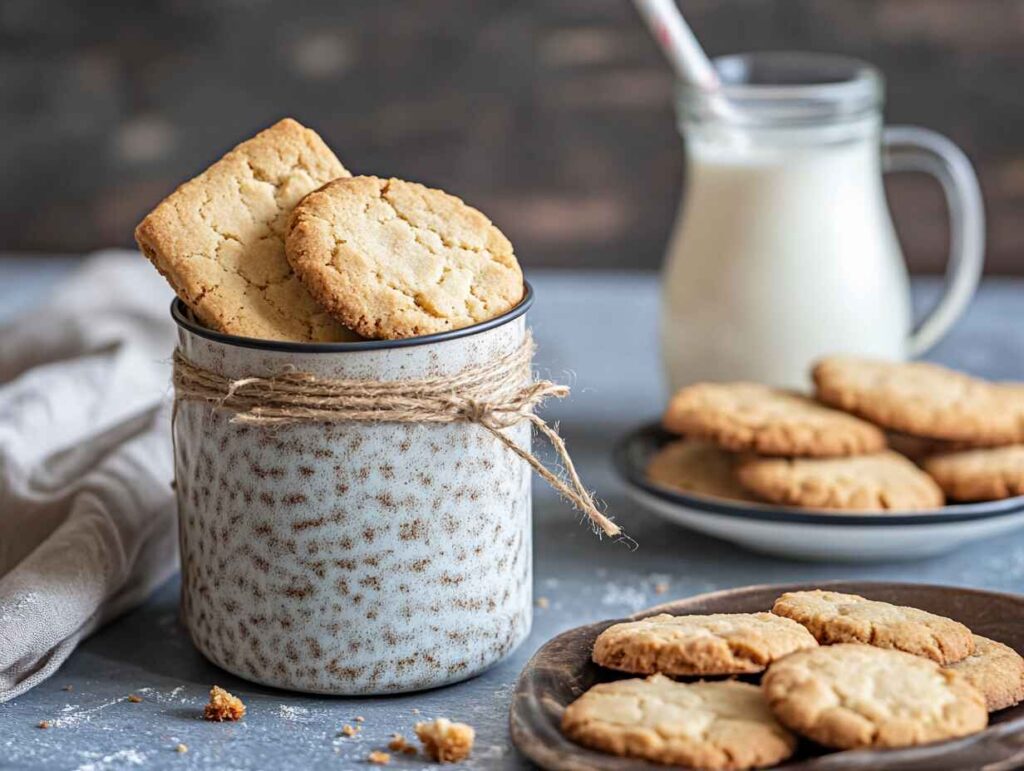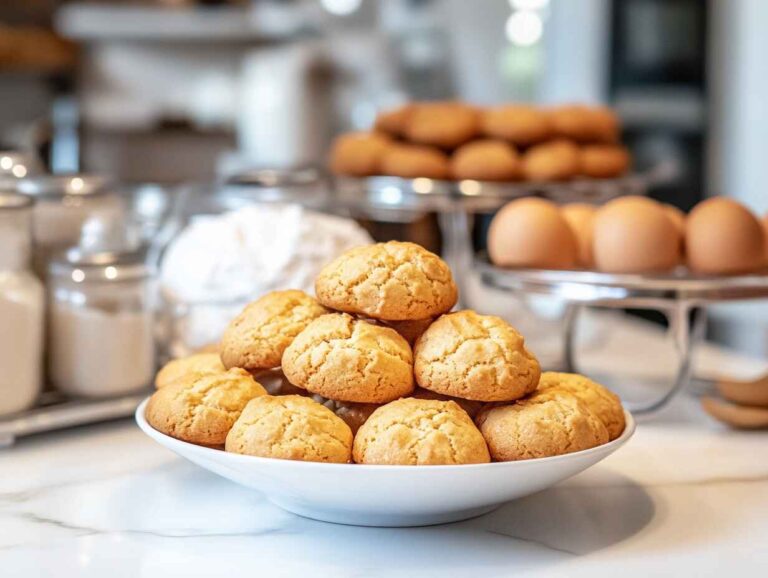Are you tired of baking cookies that are crisp and crunchy when you really want them soft and chewy? You’re not alone! Every cookie lover has had the experience of biting into a homemade cookie only to find it too hard or dry. But what if I told you that there’s a secret ingredient, or rather a combination of ingredients, that can keep your cookies soft and melt-in-your-mouth every time? 🍪
Table of Contents
The Quest for Perfectly Soft Cookies
What is the secret ingredient to keep cookies soft? As a fellow baking enthusiast, I know the struggle. There’s nothing worse than the anticipation of freshly baked cookies only to find they’ve turned out harder than you expected. But don’t fret, there are a few tricks up every baker’s sleeve to make sure those cookies stay soft, moist, and delicious!In this guide, we’ll uncover the secret ingredient to keep cookies soft, backed by science and simple techniques to make your baking foolproof.
Why Texture Matters in Cookies
When it comes to cookies, texture is just as important as taste. In fact, the right texture can elevate an ordinary cookie into something extraordinary. Soft cookies offer a satisfying, melt-in-your-mouth experience that crunchy cookies just can’t match. Texture can elevate a good cookie into something truly memorable. Whether you’re baking small-batch chocolate chip cookies or experimenting with creative twists, the softness of a cookie often defines its appeal.
Overview of Common Cookie Baking Issues
If you’ve been baking cookies for a while, you’ve probably encountered some common issues: cookies turning out too hard, too dry, or spreading too much during baking. These issues often stem from small mistakes in the recipe, ingredient ratios, or even the baking process itself. Understanding how these factors affect your cookies will give you the upper hand in making the perfect batch every time.
Understanding the Science of Soft Cookies
To truly unlock the secret to soft cookies, we need to answer the burning question: What is the secret ingredient to keep cookies soft? A closer look at the science behind this reveals that the texture of a cookie is influenced by various factors, from the type of ingredients used to the way they interact with heat in the oven. Understanding the role each ingredient plays will help you make better decisions when baking your next batch of soft cookies.
How Ingredients Affect Cookie Texture
Every ingredient in a cookie recipe has a purpose. Some ingredients contribute to the flavor, while others impact the texture. The key to soft cookies lies in moisture retention, which depends largely on the ingredients used. The right combination of fat, sugar, eggs, and flour, along with a few secret ingredients, will give your cookies that soft, chewy texture you’re craving. Let’s break down how each component plays a part:
- Fat (Butter or Oil): Fat contributes to the moisture in cookies, keeping them tender and soft. The type of fat used also affects the texture butter gives cookies flavor and richness, while oil tends to make cookies softer.
- Sugar: Sugar is not only for sweetness. It plays a huge role in creating the structure of the cookie. Brown sugar, in particular, helps keep cookies moist and chewy.
- Eggs: Eggs help bind the ingredients together and provide moisture, but it’s the yolks that are key to soft, chewy cookies.
- Flour: Flour is the backbone of cookies. It provides structure, but too much can make cookies dense and dry.
The Role of Fat in Keeping Cookies Soft

When baking cookies, fat (whether butter or oil) is crucial in creating a soft texture. Fat coats the flour particles, preventing them from forming gluten, which can make cookies tough. The higher the fat content in your cookie dough, the more tender your cookies will be. But be careful! Too much fat can cause your cookies to spread too thin. So, it’s all about balance!
The Impact of Sugar: A Key Element for Softness
Sugar is more than just a sweetener; it’s a moisture-retaining powerhouse. Brown sugar, which contains molasses, adds moisture and helps cookies retain their softness for days. On the other hand, white sugar tends to draw moisture out of the dough, which can result in a firmer cookie. By using a combination of brown and white sugar, you get the perfect blend of moisture and crispness around the edges while keeping the center soft and chewy.
Secret Ingredient #1: The Importance of Brown Sugar
Okay, so now we’re getting to the good stuff! The first secret ingredient to keeping cookies soft is brown sugar. Yes, you read that right! Brown sugar, with its molasses content, is a game-changer when it comes to soft cookies.
Why Brown Sugar Keeps Cookies Soft Longer
Brown sugar is hygroscopic, which means it attracts and retains moisture. This makes it the perfect sugar for soft cookies. When you bake with brown sugar, the molasses prevents the cookies from drying out too quickly. So, not only do your cookies stay soft, but they also stay fresh longer! This is especially important if you’re planning on storing your cookies for a few days.
How to Substitute Brown Sugar for White Sugar
Don’t have brown sugar on hand? No worries! You can easily substitute it with white sugar by adding a little molasses. For every cup of white sugar, add about one tablespoon of molasses. Mix it in thoroughly, and voila! You’ve got yourself an excellent substitute that will still yield soft cookies. Learn more about this in our comprehensive guide to how long a batch of cookies lasts.
Secret Ingredient #2: Adding Cornstarch to the Dough
Another secret ingredient to consider is cornstarch. While it may sound strange, cornstarch is actually a fantastic way to achieve soft, melt-in-your-mouth cookies.
What Does Cornstarch Do to the Texture of Cookies?
Cornstarch helps to soften the texture of cookies by preventing gluten formation. Gluten can make cookies chewy, but it can also make them tough. Cornstarch interferes with gluten development, leading to a cookie that’s lighter, softer, and more tender. The result? A cookie that practically melts in your mouth!
How to Incorporate Cornstarch for Softness
Incorporating cornstarch into your cookie dough is easy. Simply replace about 2 tablespoons of flour with cornstarch for every cup of flour in your recipe. This small tweak will make a huge difference in the texture of your cookies. But remember, balance is key too much cornstarch can alter the flavor and structure of your cookies, so don’t overdo it! If you’re looking for tips on balancing ingredients for that perfect cookie, check out our article on why peanut butter cookies aren’t chewy.
Secret Ingredient #3: Using More Egg Yolk
Moving on to our next secret ingredient: egg yolks. It’s not just the whites that matter when it comes to baking cookies egg yolks play a pivotal role in keeping your cookies soft and chewy.
The Role of Egg Yolk in Moisture Retention
Egg yolks are packed with fat and lecithin, which helps to retain moisture in cookies. This means your cookies will stay soft and tender longer. When baking cookies, using only the egg yolk rather than the whole egg results in a richer, moister texture. It’s all about keeping that dough hydrated and balanced. In fact, using a higher ratio of egg yolks to egg whites can give you a more luscious cookie with a melt-in-your-mouth texture. If you really want a soft cookie, experiment with adding an extra yolk to your recipe!
How to Balance Egg Whites and Egg Yolks in Cookie Recipes
If your recipe calls for whole eggs but you’re looking to improve the softness, try adjusting the egg ratio. For every two eggs in your recipe, you can use one whole egg and an extra yolk, or simply replace one of the eggs with two yolks. This substitution will enhance moisture retention and provide that perfect soft texture. Remember, a delicate balance of yolk and white is key too many egg whites might make your cookies a bit more firm and chewy, so moderation is essential. Explore similar ingredient hacks in 4-ingredient peanut butter cookies.
Secret Ingredient #4: The Importance of Proper Butter Usage
Butter, butter, butter! We all know that butter is a key ingredient in cookies, but the way you use it can make all the difference. Cold butter versus softened butter can lead to drastically different results in your cookies. 🧈
How Cold vs. Room Temperature Butter Affects Softness
When it comes to making soft cookies, the temperature of your butter is crucial. Softened butter incorporates into the dough more easily and results in a smooth, even texture. Cold butter, on the other hand, causes the dough to hold its shape more, leading to thicker, chewier cookies that don’t spread as much. The best choice depends on the type of cookie you want to bake. For softer, spread-out cookies, room-temperature butter is the way to go. Cold butter will give you a firmer dough with a slightly denser texture, so it’s perfect for cookies like shortbread, but not ideal for super-soft ones.
The Best Types of Butter for Soft Cookies
Not all butter is created equal! When you’re aiming for soft cookies, you want to choose high-quality butter with a higher fat content, such as European-style butter. This butter is richer and contributes more to the softness and flavor of the cookies. If you want an even softer texture, you can also substitute some of the butter with shortening. Shortening has a higher melting point than butter, which can help your cookies hold their shape while maintaining a soft, tender texture.
Secret Ingredient #5: The Role of Molasses or Honey
Molasses and honey are two ingredients often overlooked when it comes to baking cookies, but they can play a big role in ensuring your cookies remain soft and moist. 🍯
How Molasses and Honey Contribute to Moisture
Molasses and honey are both natural sweeteners that help retain moisture in baked goods. Molasses is often found in gingerbread and spice cookies, but it’s an amazing ingredient to add to just about any cookie dough. Honey, on the other hand, gives your cookies a slight floral sweetness and keeps them soft by attracting moisture from the air. Both ingredients have hygroscopic properties, meaning they pull moisture into the dough and keep it there. This results in cookies that are both soft and flavorful!
Differences Between Molasses and Honey for Soft Cookies
While both molasses and honey can keep cookies soft, they do so in slightly different ways. Molasses has a bold, slightly bitter flavor, which pairs wonderfully with spices and richer cookies. Honey is much milder and sweeter, making it ideal for lighter, sweeter cookies. The choice between the two depends on your personal preference and the flavor profile you’re aiming for. Either way, you can count on both ingredients to help keep your cookies moist and soft for longer periods.
If you’ve ever wondered why peanut butter cookies get hard, the answer lies in precise baking times.
Tips for Storing Soft Cookies to Maintain Freshness
So, you’ve baked the perfect batch of soft cookies and mastered What is the secret ingredient to keep cookies soft?, but how do you keep them soft for days to come? Proper storage is key to maintaining that melt-in-your-mouth texture. For detailed steps on preserving baked goods, visit our article about how long a batch of cookies lasts.

The Best Containers for Keeping Cookies Soft
To ensure your cookies stay soft and fresh, store them in an airtight container. This prevents moisture from escaping and helps maintain their softness. You can place a slice of bread in the container with your cookies believe it or not, the bread helps keep the cookies moist! This works because the bread absorbs any excess moisture, preventing it from being drawn out of the cookies. Just be sure to replace the bread slice every few days if you plan to keep your cookies for an extended period.
How to Freeze Cookies for Long-Term Softness
If you have leftover cookies (which is rare, right? 😆), freezing them is a great way to preserve their softness. To freeze cookies, place them in a single layer on a baking sheet and freeze them for a few hours. Once frozen, transfer the cookies to an airtight container or freezer bag. When you’re ready to enjoy them again, just let them thaw at room temperature, and they’ll be just as soft as the day you baked them!
Frequently Asked Questions (FAQ)
Why do my cookies turn out hard or dry?
Cookies can become hard or dry if the dough is overworked, there’s too much flour, or if they’re baked too long. Using the right balance of ingredients, like brown sugar and egg yolks, and following the correct baking times will help prevent this.
What is the secret ingredient for soft cookies?
The secret to soft cookies lies in a combination of ingredients that help retain moisture and create tenderness. Brown sugar, cornstarch, egg yolks, softened butter, and molasses or honey all play crucial roles in keeping cookies soft.
Can I substitute brown sugar for white sugar in cookie recipes?
Yes! Brown sugar contains molasses, which helps keep cookies soft. If you don’t have brown sugar, you can substitute it by adding one tablespoon of molasses per cup of white sugar.
Conclusion: The Secret Ingredient Revealed and Key Takeaways
And there you have it! The answer to What is the secret ingredient to keep cookies soft? lies in the right combination of ingredients, proper storage, and a little bit of know-how. Whether it’s brown sugar, cornstarch, egg yolks, or molasses, each ingredient plays an essential role in ensuring your cookies are soft, chewy, and absolutely irresistible. 🍪
Here are the key takeaways to remember:
- Brown sugar retains moisture and helps keep cookies soft longer.
- Cornstarch softens the texture and prevents gluten from making your cookies tough.
- Egg yolks add richness and moisture to your dough, contributing to a softer texture.
- Butter should be softened to create the perfect balance of tenderness and flavor.
- Molasses or honey both attract moisture and help keep your cookies soft.
By following these tips and experimenting with your ingredients, you can create the softest cookies imaginable. So, next time you’re ready to bake, use these secrets to your advantage and wow your friends and family with the perfect batch of cookies that stays soft and delicious from the first bite to the last. Happy baking!
Print
What is the secret ingredient to keep cookies soft?
These soft cookies are the perfect balance of chewy and tender with a melt-in-your-mouth texture. With a hint of vanilla and a touch of sweetness, they’re an easy and delightful treat for any occasion. Whether enjoyed with a glass of milk or as a sweet snack, these cookies are sure to become a favorite!
- Total Time: 25 minutes
- Yield: 24 cookies
Ingredients
Dry Ingredients
- 2 ¼ cups all-purpose flour
- 1 tsp baking soda
- ½ tsp salt
Wet Ingredients
- 1 cup unsalted butter, softened
- 1 cup granulated sugar
- 1 cup packed brown sugar
- 2 large eggs
- 2 tsp vanilla extract
Additional Ingredients
- 1 cup chocolate chips (optional)
Instructions
Preheat the oven:
Preheat your oven to 350°F (175°C) and line a baking sheet with parchment paper.Mix dry ingredients:
In a medium bowl, whisk together the flour, baking soda, and salt. Set aside.Cream the butter and sugars:
In a large mixing bowl, beat the softened butter with granulated sugar and brown sugar until light and fluffy, about 2-3 minutes.Add eggs and vanilla:
Add eggs, one at a time, and beat well after each addition. Stir in vanilla extract.Combine wet and dry ingredients:
Gradually add the dry ingredients to the wet ingredients and mix until just combined.Fold in chocolate chips:
If desired, gently fold in the chocolate chips (or any other mix-ins you like).Scoop and bake:
Using a cookie scoop or spoon, drop dough onto the prepared baking sheet. Bake for 10-12 minutes or until the edges are golden, but the center is still soft.Cool:
Let the cookies cool on the baking sheet for 5 minutes, then transfer to a wire rack to cool completely.
Notes
- Make sure not to overmix the dough; this will help keep the cookies soft and tender.
- If you prefer a thicker cookie, chill the dough in the fridge for 30 minutes before baking.
- For an extra soft texture, slightly underbake the cookies, allowing them to set as they cool.
- Prep Time: 15 minutes
- Cook Time: 10-12 minutes
- Category: Dessert
- Method: Baking
- Cuisine: American
- Diet: Vegetarian

